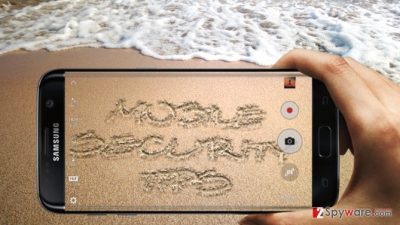10 mobile security tips for summer holidays
Your long-awaited dream holiday is just around the corner, and we are sure that you have already prepared your smartphone for it. You may have deleted or exported part of the gallery and installed some cool new apps that might come in handy on your journey. However, we hope that you haven’t forgotten about mobile security measures. Holiday and festival season is the favorite season of both real life and cyber criminals[1], and you should take all possible steps to protect yourself and your smartphone so that attackers wouldn’t be able to swindle your personal, financial or other valuable data. Therefore, we provide these ten mobile security tips so that you could spend your holiday without having to worry about cyber threats. Before you start packing your luggage, sit down and carefully prepare your device according to instructions.

- First things first, make sure your smartphone is running the latest version of whatever OS system it has installed on it. If you are using a jailbreaked phone, better unjailbreak it to patch extra security holes[2].
- Set a strong password on your phone. If you accidentally miss your phone or if it gets stolen, a good password will prevent the criminals from accessing your phone and data stored on it.
- Take advantage of a GPS-based device location service[3] provided by your smartphone’s vendor. Android users can use Android Device Manager or the Find Device app, while Apple users should use Find My iPhone app. Make sure you remember login details, otherwise you won’t be able to use these services. Features provided by both Android or iOS can allow you to locate the smartphone or wipe all of the information stored on it so that the criminals could not use it.
- When possible, enable two-factor authentication[4] for applications that suggest such feature (Facebook, Gmail, DropBox, EverNote and many other popular apps provide 2FA).
- Turn off Bluetooth – hackers can exploit this wireless technology and gain access to your smart device.
- If possible, avoid using public WiFi hotspots, or at least be very careful when you must use it. Due to lack of encryption, cyber criminals can find out what information you transmitted or received when using a public WiFi connection. To put it simply, browse through sites that provide general information and avoid logging into any of your accounts – imagine that everything you type in is being monitored by someone. Never log into your bank account or websites that require entering your credit card information.
- If you plan to use public WiFi whenever possible, we suggest using a VPN. VPN[5] creates a data tunnel between the local network and the exit node in another location, creating an illusion as if you were in another place. Using a personal VPN will keep your data encrypted and protected from eavesdropping. However, you should choose a trustworthy VPN or even consider investing in one if you use public WiFi hotspots all the time.
- Before you leave, think about all of the apps that might require your credit card information. For instance, if you plan on using Booking, Uber or another service, enter your payment information while you’re still at home. This way, you won’t have to type such valuable information such as credit card numbers or passwords while in public.
- If you need to create a personal hotspot for your friend or relative, use a neutral name for it and create a secure password. If you suspect that some stranger has gained access to use your hotspot, check the number of connected devices.
- Consider installing an anti-spyware or anti-malware program from a reputable security firm. While most people have antivirus or anti-malware software installed on their computers, for some reason they do not consider mobile security as an important matter.
- ^ Linas Kiguolis. Reasons why cyber criminals are eager to hack your smartphone. 2-Spyware. Fighting against Spyware.
- ^ Cara West-Wainwright. Hack the Halls: Mobile Security Tips for Holiday Travel. TrendMicro Blogs. Simply Security News, Views and Opinions.
- ^ Marie Brewis. How to find my phone: Track a lost Android, iPhone or Windows Phone. PC Advisor. Latest How-To.
- ^ Eric Griffith. Two-Factor Authentication: Who Has It and How to Set It Up. PCMag. Technology Product Reviews, News, Prices & Downloads.
- ^ What Is a VPN? And Why You Should Use a VPN on Public Wi-Fi. Norton Community. Protection Blog.

